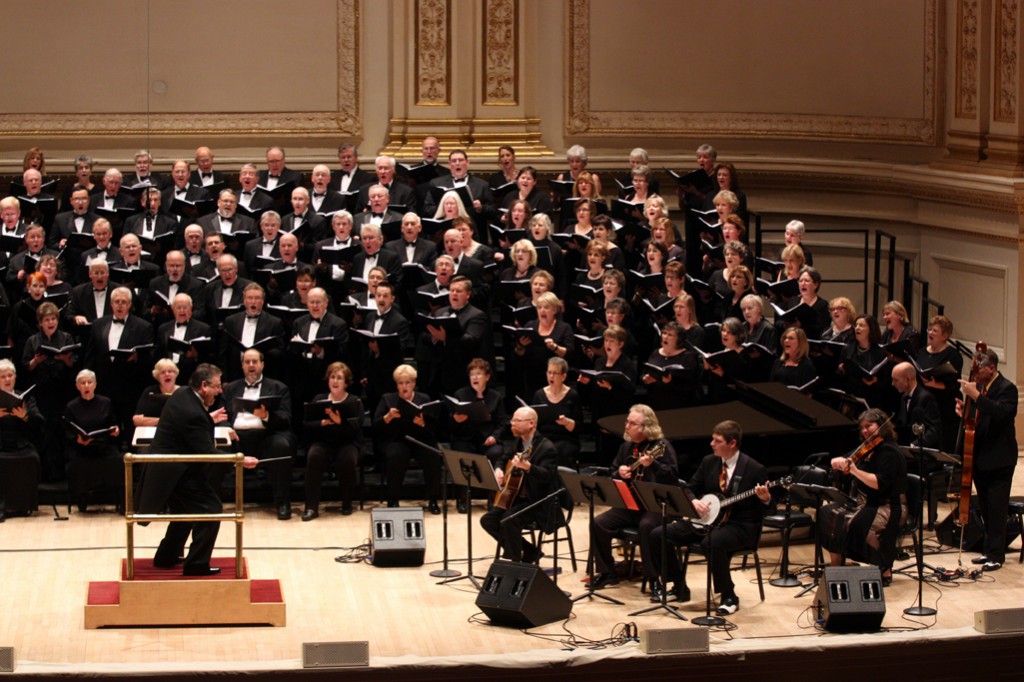Distinguished Concerts International New York (DCINY) presents Life and Remembrance
Distinguished Concerts Orchestra; Distinguished Concerts Singers International;
Mark Hayes, composer/conductor; Mark Gilgallon, baritone
Pepper Choplin, composer/conductor; Gabriella Barbato; Don Davidson, narrator
Avery Fisher Hall, Lincoln Center, New York, NY
May 25, 2015
On Memorial Day, May 25, 2015, Distinguished Concerts International New York (DCINY) presented a concert entitled Life and Remembrance, featuring Mark Hayes’ Requiem and the New York premiere of Our Father: A Journey Through the Lord’s Prayer from composer Pepper Choplin. With singers from Arizona, Arkansas, California, Colorado, Florida, Illinois, Maryland, Massachusetts, Missouri, North Carolina, Ohio, Oklahoma, Oregon, Pennsylvania, South Carolina, Virginia, and “individual singers from around the globe,” the stage was set for what proved to be a poignant evening of music.
In honor of those who have served or are serving our nation, DCINY offered all U.S. Military Veterans and Active Servicemen and Women complimentary tickets for this concert, a gesture that this reviewer very much appreciated, and one that reflects honor on this fine organization.
Composer Mark Hayes took the podium to conduct his Requiem. This reviewer was present at the World Premiere of this work (May 27, 2013), so I was curious to hear if Mr. Hayes had made any changes to his work, and if a second hearing would have any effect on my already favorable opinion. For background information about the work and my impressions, interested readers can read the review Mark Hayes-composer/conductor in Review. As for the first question, there were no changes in the work. As to the second, I found my initial impressions to be largely unchanged (the beautiful Agnus Dei is still my favorite movement), however, I gained a deeper appreciation for this work, as there was no doubt that this performance of the Requiem was in all ways was superior to the one I had heard prior. There were many melodic and harmonic nuances captured that were missing in the earlier performance. The orchestra playing was warm and full-bodied in lyrical sections and crisp and decisive in the sinister Dies Irae, the chorus was well prepared, and the diction was much clearer (especially in the Dies Irae). Finally, Mr. Hayes himself showed increased confidence at the podium in what was an outstanding performance.
Baritone Mark Gilgallon wrung every last drop of emotion in his solo work in the Dies Irae. His voice captured the pathos and despair with his dynamic delivery. At the peak of the movement, his voice cut through the large forces behind him like thunder, but without any loss of clarity or straining in his voice. Finally, he retreated into a pleading tone, asking for eternal rest at the close.
As the end of the Lux Aeterna quieted to silence, one could hear the proverbial pin drop. Mr. Hayes held his baton until every bit of sound had faded away. The large audience was moved by this excellent work, letting the silence wash over the hall for a minute or so before breaking into loud applause. It was a justly deserved standing ovation for Mr. Hayes and the performers. A recently released recording of the Requiem, with the Beckenhorst Orchestra and Singers, and Mr. Gilgallon, is available for purchase at the composer’s website www.markhayes.com
During the intermission, in what has become a DCINY Memorial Day concert tradition, The Patriot Brass Ensemble entertained the audience with patriotic tunes from the balcony, beginning their set with a medley dedicated to each branch of the Armed Forces. The veterans, servicemen and women in attendance were asked to stand when their respective hymn was played. Some were young, some in uniform (including a music loving sailor in the city for Fleet Week), others older, but all stood proudly. Our nation is grateful for their service.
After intermission, Pepper Choplin took to the stage to conduct the New York premiere of his cantata Our Father: A Journey Through the Lord’s Prayer. As Mr. Choplin stated in his thoughtful program notes (click to read), he had spent countless hours setting the lines of the Lord’s Prayer and contemplating the power of its words. It is at once obvious that Mr. Choplin has poured his soul into this work, a music testament of the power of his faith, unashamedly so in this nine-movement blockbuster work. Overflowing with life, light, and praise, Our Father: A Journey Through the Lord’s Prayer truly is a journey through Matthew 6:9-13, probing the seemingly simple text for deeper meaning.
There is much to praise, but I will mention what I considered to be the highlights of the work – the big sound of the anthem-like Our Father in Heaven, the poignant and nostalgia-tinged Holy Be Thy Name, the driving energy of Let Your Kingdom Come where the sun breaks through the clouds of doubt, the beautiful, heartfelt Forgive Us, and the uneasy tension of sinister-like chant in Lead Us From Temptation.
Narrator Don Davidson read what might best be called brief homilies between each movement, and the audience was invited to recite the Lord’s Prayer before the final movement, which many did. While these were touches that enhanced the experience, they could be removed for performances of a more secular nature without any negative overall effect. Soprano Gabriella Barbato sang with child-like innocence and beauty in her featured solos.
The ebullient Thine is the Kingdom brought the work to a rousing close. The audience barely waited for the last notes before leaping up into a prolonged standing ovation for Mr. Choplin and all the performers. Congratulations to all.


